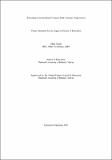| dc.description.abstract | Background: Many Irish teachers are gaining overseas teaching experience at some stage of their teaching career for varying lengths of time before returning to teach “at home”. This study examined returnee teachers’ interpretation of the impact their overseas experiences has had on them and their teaching. These teachers had travelled to 11 different countries to teach for various lengths of time before returning to Ireland.
Method: Interpretative Phenomenological Analysis (IPA) was selected as a research design over alternative qualitative approaches as it is consistent with the epistemological position of the research question. The principal aim of IPA research is to ascertain how people make sense of their experiences. The focus of IPA is on the detailed examination of personal lived experience, the meaning of said experience to participants and how participants make sense of that experience. Participants were recruited through advertising on social media and official teacher channels. Semi-structured interviews were conducted with ten returnee Irish teachers. Data was analysed guided by IPA.
Findings: Five superordinate themes were identified which described the challenges faced by the participants at different stages of their journey – before, during and after their overseas teaching experience: 1) Intercultural awareness; 2) Personal and professional development; 3) Identity; 4) Teacher knowledge and practice; 5) Re-adapting to the home environment. Findings suggest that the overseas teaching experience had positive outcomes on the participants’ professional and personal development, intercultural awareness, identity, knowledge and understanding, and practice. Increased confidence, flexibility, tolerance, empathy, communication skills, and desire for further learning were also common themes found within responses. A transition ensued resulting in them integrating their newly formed knowledge, understandings and skills despite the challenges they encountered. They expressed a desire to share their knowledge and skills gained overseas upon their return, however, this required support at both school and educational system level. Participants’ responses indicated that a major benefit of an overseas teaching experience was the opportunity it provided to observe and experience at first hand an educational system that was different from those they had previously experienced. Participants described how they developed a range of personal attributes that enabled them to become more confident, flexible and resourceful teachers. Their experiences upon their return were not without challenges; they identified a range of issues, which they found difficult, including a lack of interest in their overseas teaching experience shown by their colleagues, the institutionalisation and homogeneity of the Irish educational system and lack of recognition by educational authorities of any overseas teaching position held by the participants. Many participants felt that the rich cultural experiences enhanced and extended their personal and professional development and gave them confidence to work with a range of ethnically and culturally diverse learners upon their return to their home countries. In addition, it inspired them to undertake further study in Higher Education.
Conclusion: The findings suggest that participants viewed their overseas teaching experience as a vehicle for personal and professional development; reflected on challenges that emerged from an overseas experience; and developed globalised perspectives of teaching and learning. They also developed their capacity to make connections to their teaching practice, to show empathy, challenge inequities in the classroom, and acknowledge gaps where they existed in professional learning opportunities. Overall, the study develops new knowledge and offers rich insights from a previously neglected and untold perspective that of the returnee teacher, into the impact their overseas teaching experience has had on them and their teaching. What the study has to say should be of immense benefit to educators and educational authorities in a changing, Irish educational landscape. | en_IE |


